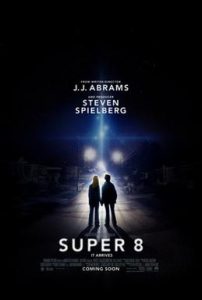
(Judge Dredd Megazine, Rebellion)
Super 8 is directed by J.J. Abrams, but an Abrams who for this outing is channeling the spirt of producer Papa Spielberg. The story opens with a tragedy, obliquely handled in the language of film. We see a signboard in an ironworks, showing the number of days since the last accident, and then we see that number being changed to zero. The victim is a mother; her pale young son Joe (newcomer Joel Courtney) sits outside the home where the wake is happening, on a swing in the snow. It’s an almost fairy-tale image of child isolation; there’s a very similar image in the horror Let the Right One In, and its remake Let Me In. (And given the juggernaut franchise that’s ending this month, Super-8’s wistfulness also recalls some of the quiet interludes in the very first Harry Potter film, usually dismissed.) Another man enters the house, and Joe’s devastated father (Kyle Chandler) attacks him; need we say this has a heavy bearing on the plot? Then we cut to several months later, and the main story starts.
School has let out to summer in Super 8’s middle-American small town, framed under thick forests like the suburbia in E.T. Joe is one of a band of junior film-makers, marshalled by director/leader Charles (Ryan Griffiths), whose penchant for zombies and generous frame puts us in mind of a certain Kiwi auteur, whose early films didn’t have many more resources than this lot. The technology is limited by Super 8’s 1979 setting (we glimpse the Three Mile Island nuclear reactor on TV, the Fukushima of its day). Arming himself with Super 8 cartridges, walkie talkies, Wellesian hubris and a newly-acquired actress debutante (Elle Fanning), who can imbue even a silly zombie film with fake reality, Charles and his crew set out for a train station at midnight, more magic under flare-lights than Hogwarts ever was.
If you’ve seen the teaser, then you know what happens next. The children witness an epic explosion of a train crash from the inside; the spectacle is presented less as a realistic disaster than a pubescent boy’s fever dream of erupting fires and flying carriages, with an enchantment that’s entirely absent from the disaster-porn of Roland Emmerich or Final Destination. Something is released in the crash, the troops roll into town and Charles finds he has the ready-made backdrop for his zombie picture. (Anyone who’s read about how Gareth Edwards made last year’s breakout British indy Monsters, some of which was filmed in a hurricane-blasted Texas, should know how true this rings.)
Super 8 is a good, not great, film. As all the pre-publicity has stressed, Abrams is effectively directing “as” Spielberg; if the studio had swapped the credits, everyone would have thought this was a signature Steven film. The borrowings are obvious – E.T., Close Encounters, and shades of a more grown-up Goonies. The main difference is that after Super 8’s first-act thrills, it takes a long time before we get more money-shots; in that respect, if no other, the film’s closer to Monsters.
Abrams’s film, though, made me slightly restless in a way Monsters didn’t. There’s not a false note between the fresh-faced actors, but the character-scripting is over-determined, and. the mid-stretch drama isn’t strong enough to justify its lesiureliness. There’s no moment to compare with Richard Dreyfuss shaping mashed potato into a mountain in Close Encounters, or cute little Henry Thomas yelling “Penis Breath!” in E.T.
Abrams visibly tries for emotion of that kind in a scene where Joe and Alice watch Super 8 home movies in Joe’s room, showing how film shapes our understanding of who we are, but its payoff is too tidily on-the-nose to disconcert. At worst, there are a few moments in Super 8 that heard towards the Spielberg pabulum of Amazing Stories, the 1980s TV series he created, short both of the terror of Jaws and Jurassic Park, and E.T.’s not-so-folksy suburban poetry.
In the film’s last scenes, though, the fever dreams return spectacularly and satisfyingly, full of wildly mashed-up adventure illustrations and the noisier parts of Spielberg’s War of the Worlds. At least, they satisfy unless you’re the kind of person who complained that the beautiful post-Disney visuals in Close Encounters’ finale made no logical plot sense whatsoever; if you do, then you’ll find Super 8’s ending a lobotomised monstrosity. Even so, you’ll probably smile at the Easter-egg bonus material as the end-credits roll; it’s definitely in the top five of that sub-genre.
(c) 2018 Rebellion A/S. Reprinted with permission.
[amazon_link asins=’B00GS801KC,B003L76RYW’ template=’ProductGrid’ store=’anime04c-21′ marketplace=’UK’ link_id=’bf022e84-63d3-4dd6-a657-4b5c7beb12b4′]
